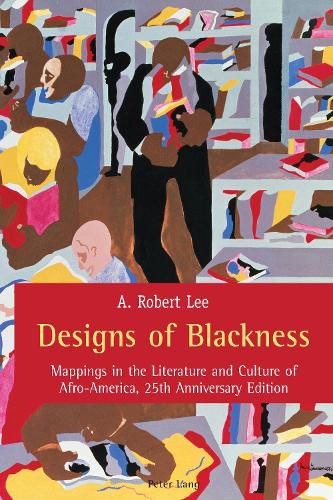Readings Newsletter
Become a Readings Member to make your shopping experience even easier.
Sign in or sign up for free!
You’re not far away from qualifying for FREE standard shipping within Australia
You’ve qualified for FREE standard shipping within Australia
The cart is loading…






This title is printed to order. This book may have been self-published. If so, we cannot guarantee the quality of the content. In the main most books will have gone through the editing process however some may not. We therefore suggest that you be aware of this before ordering this book. If in doubt check either the author or publisher’s details as we are unable to accept any returns unless they are faulty. Please contact us if you have any questions.
Across more than two centuries Afro-America has created a huge and dazzling variety of literary self-expression. Designs of Blackness provides less a narrative literary history than, precisely, a series of mappings-each literary-critical and comparative while at the same time offering cultural and historical context. This carefully re-edited version of the 1998 publication opens with an estimation of earliest African American voice in the names of Phillis Wheatley and her contemporaries. It then takes up the huge span of autobiography from Frederick Douglass through to Maya Angelou. Harlem on My Mind, which follows, sets out the literary contours of America’s premier black city. Womanism, Alice Walker’s presiding term, is given full due in an analysis of fiction from Harriet E. Wilson to Toni Morrison. Richard Wright is approached not as some regulation realist but as a more inward, at times near-surreal, author. Decadology has its risks but the 1940s has rarely been approached as a unique era of war and peace and especially in African American texts. Beat Generation work usually adheres to Ginsberg and Kerouac, but black Beat writing invites its own chapter in the names of Amiri Baraka, Ted Joans and Bob Kaufman. The 1960s has long become a mythic change-decade, and in few greater respects than as a black theatre both of the stage and politics. In Leon Forrest African America had a figure of the postmodern turn: his work is explored in its own right and for how it takes its place in the context of other reflexive black fiction. African American Fictions of Passing unpacks the whole deceptive trope of race in writing from Williams Wells Brown through to Charles Johnson. The two newly added chapters pursue African American literary achievement into the Obama-Trump century, fiction from Octavia Butler to Darryl Pinkney, poetry from Rita Dove to Kevin Young.
$9.00 standard shipping within Australia
FREE standard shipping within Australia for orders over $100.00
Express & International shipping calculated at checkout
This title is printed to order. This book may have been self-published. If so, we cannot guarantee the quality of the content. In the main most books will have gone through the editing process however some may not. We therefore suggest that you be aware of this before ordering this book. If in doubt check either the author or publisher’s details as we are unable to accept any returns unless they are faulty. Please contact us if you have any questions.
Across more than two centuries Afro-America has created a huge and dazzling variety of literary self-expression. Designs of Blackness provides less a narrative literary history than, precisely, a series of mappings-each literary-critical and comparative while at the same time offering cultural and historical context. This carefully re-edited version of the 1998 publication opens with an estimation of earliest African American voice in the names of Phillis Wheatley and her contemporaries. It then takes up the huge span of autobiography from Frederick Douglass through to Maya Angelou. Harlem on My Mind, which follows, sets out the literary contours of America’s premier black city. Womanism, Alice Walker’s presiding term, is given full due in an analysis of fiction from Harriet E. Wilson to Toni Morrison. Richard Wright is approached not as some regulation realist but as a more inward, at times near-surreal, author. Decadology has its risks but the 1940s has rarely been approached as a unique era of war and peace and especially in African American texts. Beat Generation work usually adheres to Ginsberg and Kerouac, but black Beat writing invites its own chapter in the names of Amiri Baraka, Ted Joans and Bob Kaufman. The 1960s has long become a mythic change-decade, and in few greater respects than as a black theatre both of the stage and politics. In Leon Forrest African America had a figure of the postmodern turn: his work is explored in its own right and for how it takes its place in the context of other reflexive black fiction. African American Fictions of Passing unpacks the whole deceptive trope of race in writing from Williams Wells Brown through to Charles Johnson. The two newly added chapters pursue African American literary achievement into the Obama-Trump century, fiction from Octavia Butler to Darryl Pinkney, poetry from Rita Dove to Kevin Young.